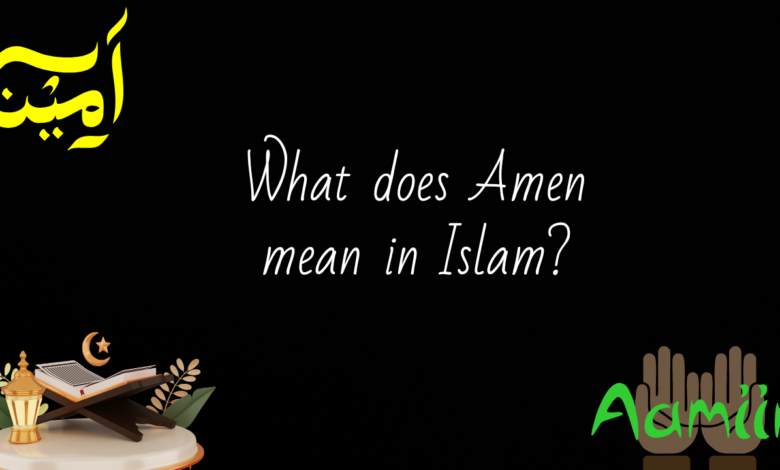What does Amen mean in Islam?

The Significance of “Ameen” in Islam: Understanding its Meaning and Usage
In the Islamic faith, the term “Ameen” holds a deep spiritual significance and is often used in various contexts during prayers and supplications. Derived from the Arabic root word “āmīn,” which means “to confirm” or “to accept,” Ameen is not merely a linguistic expression but a heartfelt declaration of faith, sincerity, and submission to the will of Allah (God). Understanding the meaning and usage of Ameen sheds light on the essence of Islamic prayer and the believer’s connection with the Divine.
Ameen in the Quran:
The term “Ameen” is not explicitly mentioned in the Quran as a standalone word. However, its equivalent concept and linguistic roots can be found in various verses of the Quran. One of the most notable instances is in Surah Al-Fatiha (The Opening), the first chapter of the Quran, where Muslims seek guidance and blessings from Allah. The verse concludes with the supplication, “Ihdina as-sirata al-mustaqim. Sirata allatheena anamta AAalayhim ghayri almaghdoobi AAalayhim wala addalleen.” Translated, this means, “Guide us to the straight path, the path of those upon whom You have bestowed favor, not of those who have evoked [Your] anger or of those who are astray.” Upon completing this verse, Muslims often say “Ameen,” signifying their agreement with and submission to the supplication’s content.
Usage in Islamic Prayer:
The term “Ameen” holds special significance during the recitation of supplications and prayers, such as the Fatiha, throughout various Islamic rituals. Its use is a moment of affirmation and agreement with the words being spoken, an expression of faith, and a heartfelt connection with Allah. The usage of Ameen signifies the believer’s acceptance of the message conveyed in the prayer and their hope for it to be answered.
Ameen as a Response:
In many cultures and Islamic traditions, it is customary for congregants to say “Ameen” aloud after the conclusion of a supplication or a recitation of Quranic verses during a sermon. This practice serves as a collective affirmation of faith and a communal expression of unity among believers. When an Imam or a person leading a prayer recites a supplication, others respond with “Ameen,” signifying their agreement and sincere desire for Allah to accept the supplication.
The Deeper Spiritual Significance:
Beyond its linguistic and ritualistic dimensions, “Ameen” carries a profound spiritual essence in Islam. It symbolizes the trust that believers place in Allah’s wisdom, mercy, and ability to answer their prayers. By saying “Ameen,” Muslims acknowledge their reliance on Allah’s divine plan, expressing their submission to His will. It serves as a reminder that while humans may articulate their desires and needs in their prayers, ultimate authority rests with Allah, the All-Knowing and All-Wise.
Conclusion:
In Islam, “Ameen” is more than just a word; it is a powerful affirmation of faith, an expression of unity within the Muslim community, and a declaration of trust in Allah’s guidance and mercy. This simple yet profound term encapsulates the essence of Islamic worship and encapsulates the believer’s connection with the Divine. Through its usage in prayers and supplications, Muslims reaffirm their commitment to seeking Allah’s guidance, acknowledging His sovereignty, and submitting to His will with humility and sincerity.
Frequently Asked Questions (FAQs) about the Meaning of “Amen” in Islam
What does “Amen” mean in Islam?
In Islam, “Amen” (أمين) is an Arabic word that is used in a similar way as in other Abrahamic religions. It is often said after reciting prayers, supplications, or verses from the Quran to express agreement, affirmation, and a desire for Allah’s acceptance.
Is “Amen” an Islamic term?
While “Amen” is not originally an Arabic word, it has been adopted into the Islamic context. Muslims use it to signify their agreement with and acceptance of the words they have just recited, whether they are prayers, verses from the Quran, or supplications.
How is “Amen” used in Islamic prayers?
Muslims say “Amen” after reciting certain phrases or prayers to show their affirmation and approval. For instance, after reciting Surah Al-Fatihah during their daily prayers (Salah), they might say “Ameen” to express their agreement with the words they’ve just recited.
Can “Amen” be found in the Quran?
The Arabic word “Ameen” is not explicitly mentioned in the Quran, but its essence of affirmation and agreement is reflected in various verses. Muslims believe in the power of prayer and use “Ameen” to reinforce their sincerity and hope for their supplications to be answered.
is there a specific pronunciation for “Ameen”?
The pronunciation of “Ameen” can vary slightly based on regional accents, but generally, it is pronounced as “ah-meen.” The pronunciation should maintain the “ah” sound at the beginning and a clear “een” sound at the end.
Can non-Arabic speakers use “Ameen”?
Yes, non-Arabic speakers can use “Ameen” in their prayers and supplications, even if they don’t speak Arabic fluently. It’s a universal expression of agreement and affirmation in the context of Islamic worship.






